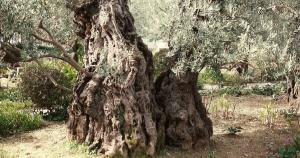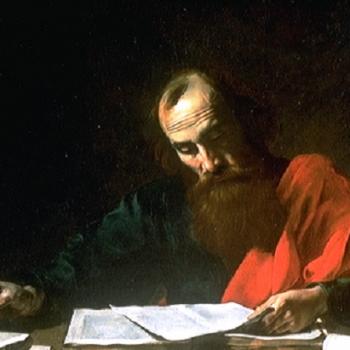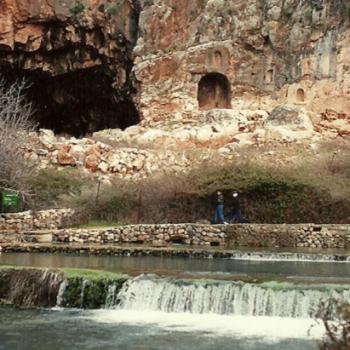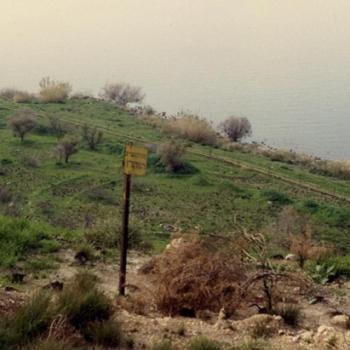It’s like the fabled “Showdown at the OK Corral,” only here the scene is a garden, the Garden of Gethsemane, and here, the stakes are sky-high: the eternity of an entire planet hangs in the balance.

Mel Gibson’s movie The Passion of the Christ opens in the Garden of Gethsemane, where Jesus is in such agony over his impending death that his face and hair are drenched with sweat. He even appears to sweat drops of blood from his forehead, according to Luke’s version of the story (Luke 22:44).
Luke uses the word “as if” (hōsei), so he does not actually say the sweat “was” blood. Why he compares Jesus’ sweat to drops of blood is not obvious. But a 1986 article in the Journal of the American Medical Association (https://jamanetwork.com/journals/jama/article-abstract/403315?redirect=true) talks about cases where persons in a highly emotional state may hemorrhage directly into their sweat glands. This could be one such case.
Only one of the earliest copies of Luke contains verses 43-44, which contain vivid details of Jesus’ struggle that are not found in any other Gospel. Hebrews 5:7 seems to be an independent echo of this scene: “(Jesus), who in the days of his flesh offered up prayers and supplications, with loud cries and tears, to the one who was able to save him from death, and he was heard because of his godly fear.”
What in the world has Jesus so absolutely mortified? At this point, Jesus hardly looks like a hero. Many of his followers have faced death far more calmly and confidently. In fact, Jesus himself shows a lot more courage later on than he shows right now. Why does Jesus come so close to falling apart here in this olive grove on the side of the Mount of Olives?
It appears that here in the Garden of Gethsemane, Jesus fears a fate far worse than death. What he faces is far worse than what any other hero has faced. What Jesus fears, in his human nature, is the knowledge that he shall suffer the endless pain of hell for a world full of sin. In his human nature, he is horrified at the prospect of being cut off from God. He can hardly bear the thought of being charged with endless ages’ worth of crimes against God.
Jesus fears, not a few hours on a cross, but an eternity of agony condensed into a short space of earthly time. He is scared of hell multiplied five billion times. It’s enough to scare the daylights out of anyone who can grasp what that means. As God in the flesh, Jesus knows exactly what that means. That explains a lot, as we watch Jesus dread what must take place. Luke uses the word agonia to describe what Jesus is going through here.
It’s at this very point that Jesus is the most severely tempted to call it quits and run. He knows how to disappear without a trace. Why not flee to India? There’s no reason why he has to stay. There’s no principle of truth or justice that requires him to stand his ground. Why not bypass the cross? Can’t the world be saved by simply learning to be better people? Isn’t there some other way?
Jesus throws himself flat on the ground and pleads with God to do exactly that – to save the world some other way, if it be possible. Take this horrible prospect of suffering away! Let people be saved through being good, or through some other religion. Or just sweep sin under the rug and pretend it doesn’t exist. After all, you’re God! You can do whatever you want, right? Must I endure the ultimate torture if there’s any other way around it?
If there was any other way for people to be put right with God, other than the cross, wouldn’t God have done it? If any other religion in the world offered a substitute way that could rescue anyone from the guilt and penalty of sin, the cross would have been entirely unnecessary. I am convinced that there was no other way. Jesus didn’t die just to give us another smorgasbord option for how to reach God.
The human Jesus begs for a better way. But the Jesus who is God in the flesh knows better. And so Jesus conquers the temptation to bypass the cross as he says, “Nevertheless, not my will, but yours, be done.”
Jesus knew that our eternal destiny all hanged on him. He knew that this is the reason why he came: not to teach us a better way, not to show us a better way, but to take our place before the firing squad, to rescue us from an eternity without God.
It was in a garden that the human race was lost. It is here in a garden that another Adam wins the struggle that the first Adam lost. His sweat, his tears, and his blood were not in vain.
How many of us could have resisted Jesus’ temptation in the garden that night? How many of us could have won that Herculanean struggle? We humans are always tempted to take shortcuts to avoid necessary suffering. Here in the Garden of Gethsemane, faced with the chance to walk away from suffering endless agony for the sins of billions of souls, Jesus proves himself champion of the universe by refusing to cave in. He knew that there was no other way. And we are forever grateful.
If you’ve never done so before, take this opportunity to place your faith in what Jesus has done for us!











